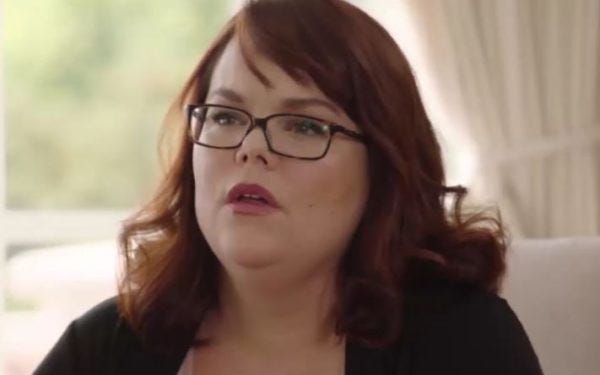In 2017, Mirriam Francis appeared in the premiere episode of the second season of Leah Remini’s A&E series, ‘Scientology and the Aftermath.’ She also helped us out with a couple of pieces here at the Bunker, but it has been a few years since we heard from her. Then, this week, she reached out with this terrific piece of writing, telling us she wants people to understand a little of what the victims in the Danny Masterson case must be going through, based on Mirriam’s own experiences trying to get law enforcement to take seriously abuse in the Church of Scientology. We are grateful that she has arrived to help us set up next week’s trial.
I was twenty-six years old, with a successful career and had purchased my first home three years prior. I had worked hard and achieved a qualification in human resources management, the area of business which I was most passionate about. I took regular vacations, travelling internationally every year.
It was easy to see how far I had come, nearly ten years since arriving in Australia with no more education than that of a fourth-grade child. Clutching a suitcase and the will to survive, I had stepped out into a world that I knew little about.
I had defied the odds, and I suppose I should have been happy. But I could not shake the cloud that hung around my head. It loomed heavy, like a storm before rainfall. There is something about trauma, how it clings to the body. I had stuffed it down for so long, until it filled all the corners of me. I realised that I needed help.
I contacted a local organization, which offered counselling for sexual assault. I scheduled my first appointment, loaded with trepidation. Had I just jeopardized my spiritual freedom for the rest of eternity?
I had been taught as a young child that psychologists were evil. I was no longer an active Scientologist, but I had yet to discount it completely. I felt anxious, but it was worth the risk to lift the darkness that I had been unable to escape.
Renee greeted me in the reception lounge. Her hair hung around her face in loose, springy curls and her attire was relaxed, with a pair of jeans and a blouse. She led me to what would be our room for the next forty minutes. Two spongy armchairs sat facing each other. There were items nearby such as a bookshelf and a lamp which cast a soft, warm glow. The window had a view to a small garden courtyard. I swallowed and sat down. I rubbed my sweaty palms across the top of my work slacks.
Renee said that this session was for us to get to know each other. I gave her a brief overview of my childhood: The period during which the sexual assaults by my father occurred and the circumstances of growing up in the Church of Scientology. I was matter-of-fact, bullet-pointing my trauma like a PowerPoint presentation. And then our time was up. I stood, smiled stiffly, scheduled the next session, and then left the counselling center.
On my way home, I decided to stop at a supermarket to buy some ingredients for dinner. I parked my car and reached for the door handle, but I didn’t budge from my seat. Instead, I dropped my hand and stared blankly out the front window for a while. I felt as though I were frozen. And then the tears came like a flood. I leant against the steering wheel and sobbed uncontrollably.
After about an hour, the grief relented, and I was able to drive home. The week leading up to the next session was uneasy, I felt as though I had sand under my skin.
After three months of counselling, I was seated in front of Renee in our usual room. “Have you considered filing a police report?” She asked. No one had ever asked me that before.
“Can I… do that?” I asked, nerves suddenly at my throat. It was expressly forbidden in Scientology. I half expected to be struck down where I sat, as though a Scientology executive might emerge from a wall and declare me a Suppressive Person right then and there.
“You sure can. That is, if you would like to?” She asked.
I sat silent for a moment, recalling when I was seventeen and had been forced to sign an affidavit. I had read the typed statement which had been thrust in front of me. It stated that I forgive my father for what he had done to me and that I would never pursue the Church of Scientology in a court of law because of it.
“Yes, I would. I would really like to do that.” I said.
Over the next month I drove to the police station a few times. First, I drove by the police station. Then I went around the block twice before driving on. Finally, I forced myself up the stairs. Each step, heavy as lead.
“I would like to make a police report.” I told the officer through the glass pane at the front desk.
“What’s it about?” He asked.
“Um, it’s about childhood sexual abuse.” I said.
“OK, take a seat. I’ll get someone from that department to see you.” He said, picking up a phone.
I sat down. The hard, plastic chair offered me no comfort. This was it, I thought. I’m not backing out now.
Moments later, an officer approached me and introduced herself as Danielle from SOCIT, the Sexual Offences and Child Abuse Investigation Team. She swiped her card at the secured door. We walked down a hall and into a room. I sat and told her my story as she made notes on a form. Then she told me that the next step was for me to write a detailed statement.
It took me many more months before I forced myself in front of my computer and typed it all out. I kept telling myself, I’ll write it tomorrow. But the next day would come and go. The thought of having to write every detail of what my father had done made my stomach curl. To remember how I would wake up in the night at the age of four years old to find my father attacking me. Not understanding what was happening and feeling so helpless that I wished that I would die. These are not easy memories.
Around this time the media announced that charges against Jan Eastgate, the President of the Scientology anti-psychiatry front group Citizens Commission on Human Rights, who had been arrested for perverting the course of justice, had been dropped.
A young woman named Carmen Rainer had spoken out about the sexual assaults which she had experienced by her stepfather as a child. She detailed that the sexual abuse had occurred from the age of seven to eleven years old and that at the age of eleven, she was coached by Jan Eastgate to deny the sexual abuse to authorities, to protect the Church of Scientology.
Though justice was thwarted at the time, her stepfather turned himself in to the police thirteen years later, following pressure on the Church after Carmen’s mother initiated legal proceedings.
Carmen’s story was familiar to me. The Church of Scientology is ruthless in the protection of itself and to that end there is no sacrifice too small. Even if it means causing senseless suffering to a child and protecting a sexual predator.
I was encouraged by Carmen’s bravery. I wasn’t alone. And I didn’t want to be scared silent anymore. On the 25th of May 2012, I e-mailed my written statement to the police.
— Mirriam Francis
We talked with Mirriam about what happened next for our podcast this week, coming Saturday.
Mark your calendars: Hearing set in the labor trafficking case
Judge Thomas Barber has set a hearing on November 17 for oral arguments in the labor trafficking case filed against Scientology in Tampa.
The lawsuit was first filed on April 28 and alleges that Valeska Paris and Gawain and Laura Baxter, all residents of Australia, were forced into the Sea Org as children, suffered neglect and harsh punishments as children and adults, and served as virtual prisoners aboard the ship. Valeska also alleged that she had been sexually assaulted by other Sea Org workers, and then had been punished for speaking up about it.
Scientology responded by filing motions to compel arbitration, a strategy that has largely been a successful one for the church in recent years. The church says that Valeska and the Baxters signed contracts between 2003 and 2015 that obliged them not to sue but to take their grievances to Scientology’s internal form of arbitration. The church’s filings ignored the allegations of neglect and abuse that the lawsuit made, and argued that a contract was a contract and these former Sea Org workers can’t sue.
Valeska and the Baxters responded with declarations detailing how they were made to sign these contracts under duress, and that they are unconscionable.
Both sides asked for the chance to present oral arguments to the court, and now Judge Barber has granted that request and scheduled the hearing. That should be some day in federal court, but we don’t know if we will be out of the Danny Masterson criminal trial by then or not. We hate to miss it.
Law & Crime had us on yesterday to discuss our story about Lisa Marie Presley being a potential witness in the Danny Masterson trial.
Thank you for reading today’s story here at Substack. For the full picture of what’s happening today in the world of Scientology, please join the conversation at tonyortega.org, where we’ve been reporting daily on David Miscavige’s cabal since 2012. There you’ll find additional stories, and our popular regular daily features:
Source Code: Actual things founder L. Ron Hubbard said on this date in history
Avast, Ye Mateys: Snapshots from Scientology’s years at sea
Overheard in the Freezone: Indie Hubbardism, one thought at a time
Past is Prologue: From this week in history at alt.religion.scientology
Random Howdy: Your daily dose of the Captain
Here’s the link for today’s post at tonyortega.org
And whatever you do, subscribe to this Substack so you get our breaking stories and daily features right to your email inbox every morning…
Now available: Bonus for our supporters
Episode 15 of the Underground Bunker podcast has been sent out to paid subscribers: We talked with OG historian Jon Atack about Mike Rinder’s just-published book, ‘A Billion Years.’ Meanwhile, we’ve made episodes 1 through 14 available to everyone, with such guests as Mark Bunker, Jesse Prince, Paulette Cooper, Michelle ‘Emma’ Ryan, Jefferson Hawkins, Patty Moher, Geoff Levin, Pete Griffiths, Sunny Pereira, Bruce Hines, Jeffrey Augustine, and Claire Headley. Go here to get the episodes!





Mirriam Francis continues to be magnificent. No matter what has been stolen from her by larger, more powerful people and entities, she has chosen to stare them down. I am looking forward to Miriam's podcast with as much dread as anticipation, because her history is enough to make me sob, but her character makes me want to beat my chest and fist pump.
Brava to Mirriam for stepping forward. An organisation which makes its members sign affidavits so as to bury legal matters is so much more than a “club.” It needs to be investigated by the proper authorities.